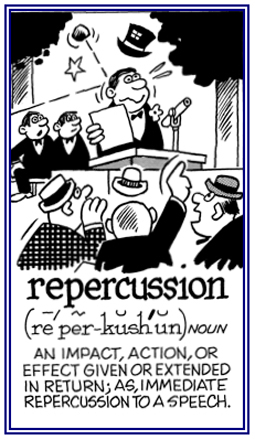cuss-
(Latin: from quatere, to shake, to strike, to beat)
percussive
Having the effect of an impact or a blow.
percussively
Relating to, or characterized by percussion.
quash
1. To suppress something; such as, a rebellion or political protest completely by means of force.
2. Etymology: "to make void, to annul, to crush", from about 1330, from Old French quasser, "to break, to smash"; from Latin quassare, "to shatter"; from quatere, "to shake".
2. Etymology: "to make void, to annul, to crush", from about 1330, from Old French quasser, "to break, to smash"; from Latin quassare, "to shatter"; from quatere, "to shake".
The meaning of "suppress" is from Medieval Latin (Latin as written and spoken about 700 to about 1500) quassare, "to make null and void"; from Latin cassus, "empty, void".
1. An unforeseen problem that results from a particular action: The repercussions of the quarrel between the two politicians on TV were widespread and affected a lot of people for a long time.

© ALL rights are reserved.
Go to this Word A Day Revisited Index
The mayor was asked if he was aware of the repercussions which could take place if his proposal that taxes should be increased actually becomes law.
2. The rebounding of a force after an impact: The repercussion of the blast could be heard for miles.
Go to this Word A Day Revisited Index
so you can see more of Mickey Bach's cartoons.
repercussive
Concerning or causing a repercussion or repercussions.
repercussively
A reference to being driven back; rebounding; reverberated.
rescue
1. To save someone or something from a dangerous or harmful situation: "The boys had to be rescued when the ice broke in the lake."
2. To prevent something from being discarded, rejected, or put out of operation.
3. Etymology: from the stem of Old French rescourre, "to shake loose"; from re-, intensive prefix, + escourre, "to cast off, to discharge"; from Latin escutere, excutere, "to shake off, to drive away"; from ex-, "out" + -cutere, a combining form of quatere, "to shake".
2. To prevent something from being discarded, rejected, or put out of operation.
3. Etymology: from the stem of Old French rescourre, "to shake loose"; from re-, intensive prefix, + escourre, "to cast off, to discharge"; from Latin escutere, excutere, "to shake off, to drive away"; from ex-, "out" + -cutere, a combining form of quatere, "to shake".
The branch of archaeology devoted to studying artifacts and features on sites which are imminently threatened by development in the form of the construction of dams, buildings, highways, etc,: Rescue archaeology is concerned with the threats to archaeological remains occurring in the form of road-building, road improvement, new building of houses, offices, and industrial complexes, the flooding of valleys for reservoirs, and improved farming techniques involving the use of deep plowing.
The rescue, or salvage, archaeologist, is concerned with the retrieval of as much information as possible about the archaeological sites before they are damaged or destroyed. Frequently time is too short and funds are too limited for anything but a brief survey.
rescuer
1. Someone who saves something from danger or violence.
2. A person who rescues another one, or others, from harm or danger: "Some of the rescuers died during the second earthquake."
2. A person who rescues another one, or others, from harm or danger: "Some of the rescuers died during the second earthquake."
Showing page 2 out of 2 pages of 24 main-word entries or main-word-entry groups.

